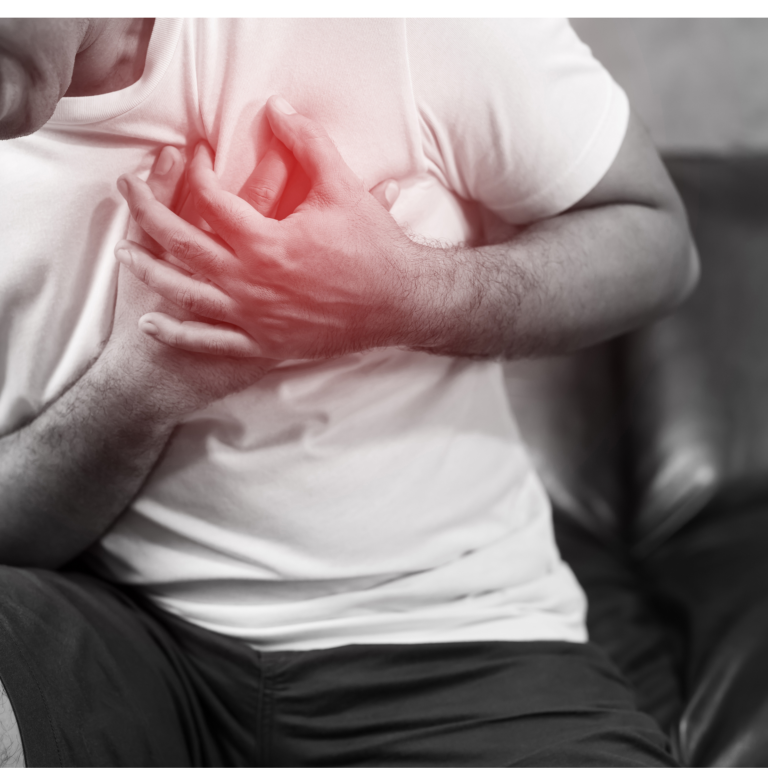
Introduction
After a large meal or spicy food, the burning sensation in your chest is usually dismissed as indigestion. Typically, that is exactly what is happening. Heartburn symptoms can occasionally indicate something more serious than just a little pain in the middle of your chest, though. In this post, we’ll examine whether it’s heartburn symptoms or something more serious and whether it’s more than a little discomfort and go through any possible underlying medical issues.
A Common Experience
In a common scenario, when people experience their first episode of heartburn, they often describe it as an intense, burning sensation right in the middle of their chest, understandably causing considerable alarm. Without delay, they typically seek immediate medical attention, fearing it might be a heart attack. The worry that a severe health issue might be at play weighs heavily on their minds. After visiting, their physician, they finally come to know that it’s usually not a cardiac problem but rather a case of heartburn and this typically occurs when stomach acid flows back up into the esophagus, causing that burning sensation.
This first experience often serves as a significant lesson in understanding their own bodies, sparking a curiosity about maintaining good health. It turns out to be just heartburn, but it often ignites a desire within them to see deeper into the realm of self-care and well-being.
Understanding Heartburn Symptoms
What’s Heartburn?
Let’s define heartburn before going into the meat of the matter. Acid reflux, also referred to as heartburn symptoms, occurs when stomach acid leaks back into the esophagus. Your chest will burn as a result of this acid rush, which is frequently accompanied by a sour or unpleasant taste.
Occasional vs. Chronic Heartburn Symptoms
Let’s differentiate between occasional and chronic heartburn symptoms. Occasional heartburn, which most people experience from time to time, is typically harmless and often related to overindulging or lying down too soon after eating. Chronic heartburn, however, is a different story. If you’re grappling with heartburn two or more times a week, it’s considered chronic and warrants attention.
Time to Be Concerned
Now that we’ve got the basics of heartburn symptoms, let’s explore when heartburn should raise your concern.
Frequent Nighttime Heartburn
If you’re waking up repeatedly at night with chest discomfort, it might be a sign of gastroesophageal reflux disease (GERD). GERD is a chronic condition where stomach acid consistently irritates the esophagus lining.
Trouble Swallowing
Persistent difficulty swallowing, known as dysphagia, can be a red flag. When paired with heartburn, it’s crucial to seek medical advice.
Unintended Weight Loss
Losing weight without trying sounds great, but when combined with heartburn, it could indicate an underlying issue, possibly involving the esophagus or stomach.
Chronic Cough
A persistent cough, especially one that doesn’t respond to typical cough remedies, could be tied to acid reflux affecting the throat.
Chest Pain
While heartburn often feels like a burning sensation, severe chest pain resembling a heart attack should never be ignored. It might be a symptom of angina or even heart attack.
Potential Underlying Causes
Now that we’ve identified when heartburn can be a sign of something more serious, let’s explore potential underlying causes.
GERD (Gastroesophageal Reflux Disease)
GERD is a chronic condition where the lower esophageal sphincter weakens, allowing stomach acid to regularly flow back into the esophagus. This can lead to esophageal damage over time.
Hiatal Hernia
When a portion of the stomach bulges into the chest, the condition is known as a hiatal hernia. This can lead to both heartburn and more severe symptoms.
Esophagitis
Esophagitis is inflammation of the esophagus, often caused by stomach acid’s corrosive effects. It can result in painful swallowing and difficulty eating.
Barrett’s Esophagus
In some cases, chronic acid reflux can progress to Barrett’s esophagus, increasing the risk of esophageal cancer.
Peptic Ulcers
Peptic ulcers, sores on the stomach lining, can cause a burning sensation similar to heartburn.
Conclusion
In conclusion, while heartburn is usually a minor displeasure, its frequency, and accompanying symptoms shouldn’t be taken lightly. Frequent, chronic, or severe heartburn should prompt a visit to a healthcare professional, as it could be a sign of underlying conditions requiring attention. Don’t dismiss persistent heartburn; it might be your body’s way of signaling a more significant health issue.
Frequently Asked Questions FAQs
Are occasional heartburn symptoms a cause for concern?
No, occasional heartburn symptoms are generally not a cause for concern and can often be managed with a change in our diet and lifestyle.
Can heartburn be a symptom of cardiac issues?
While heartburn and cardiac issues can share some symptoms, such as chest pain, they are generally distinct. If you suspect a heart attack, seek immediate medical attention.
What lifestyle changes can help manage heartburn symptoms?
Managing heartburn often involves avoiding trigger foods, eating smaller meals, and not lying down immediately after eating. It may also be beneficial to raise your bed’s head.
Can heartburn symptoms lead to cancer?
Chronic acid reflux, if left untreated, can increase the risk of developing esophageal cancer, especially in cases of Barrett’s esophagus.
When should I see a doctor about my heartburn symptoms?
If you experience frequent or chronic heartburn, have difficulty swallowing, unintentional weight loss, or severe chest pain, it’s essential to consult a healthcare professional for a thorough evaluation.
For general inquiries, feedback, questions, and suggestions about our content, please feel free to – Contact Us
